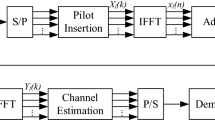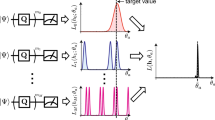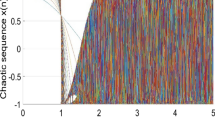Abstract
The sequential estimation (SE) algorithm has a poor performance in the environment with a low signalto-noise ratio (SNR) and a high bit error rate (BER), especially for unknown initial acquisition sequence. This paper summarizes the conventional sequence acquisition model, and discovers its several problems, which are caused by accumulating sequence innovation to all of the received sequences dispersedly. To solve these problems, the paper presents a new algorithm, CSAS-SA (controllable single accumulated state-sequential acquisition). This algorithm accumulates the sequence innovation to a single appointed sequence state and makes the useful information accumulated effectively. Through simulation, CSAS-SA has a higher probability of success acquisition. When SNR equals −3 dB, the performance can be improved by 70%.
Similar content being viewed by others
References
Ward R B. Acquisition of pseudo-noise signals by sequential estimation. IEEE Trans Commun Tech, 1965, 13: 475–483
Ward R B, Yiu K. Acquisition of pseudo-noise signals by recursion-aided sequential estimation. IEEE Trans Commun, 1977, 25(7): 784–794
Kilgus C C. Pseudonoise code acquisition using majority logic decoding. IEEE Trans Commun, 1973, 21(6): 772–774
Salih M, Tantaratana S. A closed-loop coherent acquisition scheme for PN sequences using an auxiliary sequence. IEEE J Select Areas Commun, 2004, 52(2): 1653–1659
Yang L L, Hanzo L. Iterative soft sequential estimation assisted acquisition of m-sequences. Electron Lett, 2002, 38: 1550–1551
Yang L L, Hanzo L. Acquisition of m-sequences using recursive soft sequential estimation. IEEE Trans Commun, 2004, 52(2): 199–204
Hagenauer J. Iterative decoding of binary block and convolutional codes. IEEE Trans Inf, 1996, 42(2): 429–445
Author information
Authors and Affiliations
Corresponding author
Additional information
Supported by the Program for New Centery Excellent Talents in University and the National High-Tech Research and Development Program of China (Grant No. 2007AA01Z434)
Rights and permissions
About this article
Cite this article
Ji, J., Huang, K., Jin, L. et al. Controllable single accumulated state-sequential acquisition with low signal noise ratio. Sci. China Ser. F-Inf. Sci. 52, 858–866 (2009). https://doi.org/10.1007/s11432-009-0075-z
Received:
Accepted:
Published:
Issue Date:
DOI: https://doi.org/10.1007/s11432-009-0075-z




